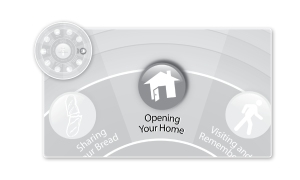 From Pastor Foley–Today marks the start of our month-long blog focus on the Work of Mercy of opening your home.
From Pastor Foley–Today marks the start of our month-long blog focus on the Work of Mercy of opening your home.
As always the temptation arises to begin the month by building a case as to why you should open your home, before moving on to lots of creative ideas about how you can do it. After all, Jesus said, “Truly I tell you, whatever you did for one of the least of these brothers and sisters of mine, you did for me.” That’s, you know, reasonably clear cut.
And trust me–there’s zero chance that I’m going to try to preach that command away or to blunt its incredible, well, bluntness. But I do want to note this: Jesus doesn’t start his parable with that command. So neither should we start our interpretation of the parable there either.
Instead, he starts here–and so should we:
31 “When the Son of Man comes in his glory, and all the angels with him, he will sit on his glorious throne. 32 All the nations will be gathered before him, and he will separate the people one from another as a shepherd separates the sheep from the goats (emphasis mine).
You might be surprised how many sermons and websites and Bible guru-type posts there are that attempt to answer the question: Why are sheep good and goats bad? What, in other words, is so wrong with goats?
Let me suggest that such a question, fascinating as it is, runs the risk of becoming an adventure in missing the point and that the far better question–which sets us up exquisitely to hear the message of the parable is this:
Why sheep and goats at all?
Sheep and goats are an odd metaphor, really, when you reflect on it. Why not just talk about the wicked and the righteous, or good people and evil ones? After all, Jesus squeezes all four of these terms into one verse, Matthew 5:45. What is added by the sheep-goat characterization?
Just this absolutely essential point:
Pasture. Sold. Separately.
In other words, before we dig into what separates sheep and goats we need to remember what they have in common: Neither species is capable of generating their own grazing land.
Translate that into the overall subject of opening your home and you get this:
Um…Why is your home closed in the first place? Who closed it?
Remember: All Works of Mercy are predicated on the idea that all we are doing is passing on the grace we first received from God. Keep that in mind and you will never be tempted toward works righteousness. In other words: If you’re playing with house money, what can you possibly give to the house that it doesn’t already own and that would thus place the house in your debt?
This is the proper starting point for this and every Work of Mercy: We begin with God’s gracious action toward us. That’s the foundation of every Bible story. Our action in response to that foundation just shows whether we understood the foundation (and the founder) rightly–or not.
In the case of the sheep-goats parable, the sheep are described (in verse 34) as “you who are blessed by my Father.” That’s about as grace-based as you can get. And notice that the sheep do not simply respond modestly to the Lord when he commends them for the food, the clothing, the shelter, and the visitation. They don’t say, “Ah, Lord, it was nothing, really.” They say, “What are you talking about?” As in: “I really have no idea what you’re talking about. I’m a sheep.”
The sheep-goats parable is first one of identity and then (and only then) one of action. When we understand that nothing in this pasture-world of ours belongs to us, then there’s no great angst or anxiety in opening whatever home you happen to be in. It is not yours. You are a sheep. If the shepherd throws another sheep in with you, what are you going to do? Go on sheep strike?
So this month, before we talk about the whys and hows of the Work of Mercy of opening your home, let’s first ponder the whats, as in: What are we?
Know that the LORD is God. It is he who made us, and we are his; we are his people, the sheep of his pasture (Psalm 100:3, NIV).
His pasture. Not ours. Any sheep would understand that: The shepherd opened his pasture to us. Of course we’ll scoot over if he sends another sheep to join us in our corner of it. And we won’t even think of our act of opening as praiseworthy, since it’s not.
You’d have to be a goat not to understand that.










